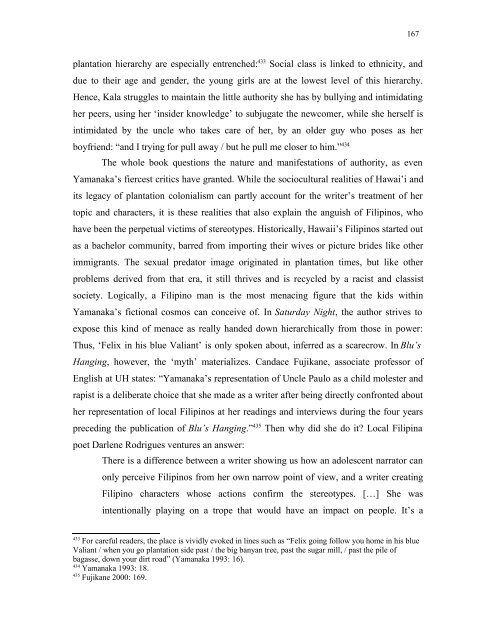A Paradise Lost - KOPS - Universität Konstanz
A Paradise Lost - KOPS - Universität Konstanz
A Paradise Lost - KOPS - Universität Konstanz
Create successful ePaper yourself
Turn your PDF publications into a flip-book with our unique Google optimized e-Paper software.
plantation hierarchy are especially entrenched: 433 Social class is linked to ethnicity, and<br />
due to their age and gender, the young girls are at the lowest level of this hierarchy.<br />
Hence, Kala struggles to maintain the little authority she has by bullying and intimidating<br />
her peers, using her ‘insider knowledge’ to subjugate the newcomer, while she herself is<br />
intimidated by the uncle who takes care of her, by an older guy who poses as her<br />
boyfriend: “and I trying for pull away / but he pull me closer to him.” 434<br />
The whole book questions the nature and manifestations of authority, as even<br />
Yamanaka’s fiercest critics have granted. While the sociocultural realities of Hawai’i and<br />
its legacy of plantation colonialism can partly account for the writer’s treatment of her<br />
topic and characters, it is these realities that also explain the anguish of Filipinos, who<br />
have been the perpetual victims of stereotypes. Historically, Hawaii’s Filipinos started out<br />
as a bachelor community, barred from importing their wives or picture brides like other<br />
immigrants. The sexual predator image originated in plantation times, but like other<br />
problems derived from that era, it still thrives and is recycled by a racist and classist<br />
society. Logically, a Filipino man is the most menacing figure that the kids within<br />
Yamanaka’s fictional cosmos can conceive of. In Saturday Night, the author strives to<br />
expose this kind of menace as really handed down hierarchically from those in power:<br />
Thus, ‘Felix in his blue Valiant’ is only spoken about, inferred as a scarecrow. In Blu’s<br />
Hanging, however, the ‘myth’ materializes. Candace Fujikane, associate professor of<br />
English at UH states: “Yamanaka’s representation of Uncle Paulo as a child molester and<br />
rapist is a deliberate choice that she made as a writer after being directly confronted about<br />
her representation of local Filipinos at her readings and interviews during the four years<br />
preceding the publication of Blu’s Hanging.” 435 Then why did she do it? Local Filipina<br />
poet Darlene Rodrigues ventures an answer:<br />
There is a difference between a writer showing us how an adolescent narrator can<br />
only perceive Filipinos from her own narrow point of view, and a writer creating<br />
Filipino characters whose actions confirm the stereotypes. […] She was<br />
intentionally playing on a trope that would have an impact on people. It’s a<br />
433 For careful readers, the place is vividly evoked in lines such as “Felix going follow you home in his blue<br />
Valiant / when you go plantation side past / the big banyan tree, past the sugar mill, / past the pile of<br />
bagasse, down your dirt road” (Yamanaka 1993: 16).<br />
434 Yamanaka 1993: 18.<br />
435 Fujikane 2000: 169.<br />
167

















